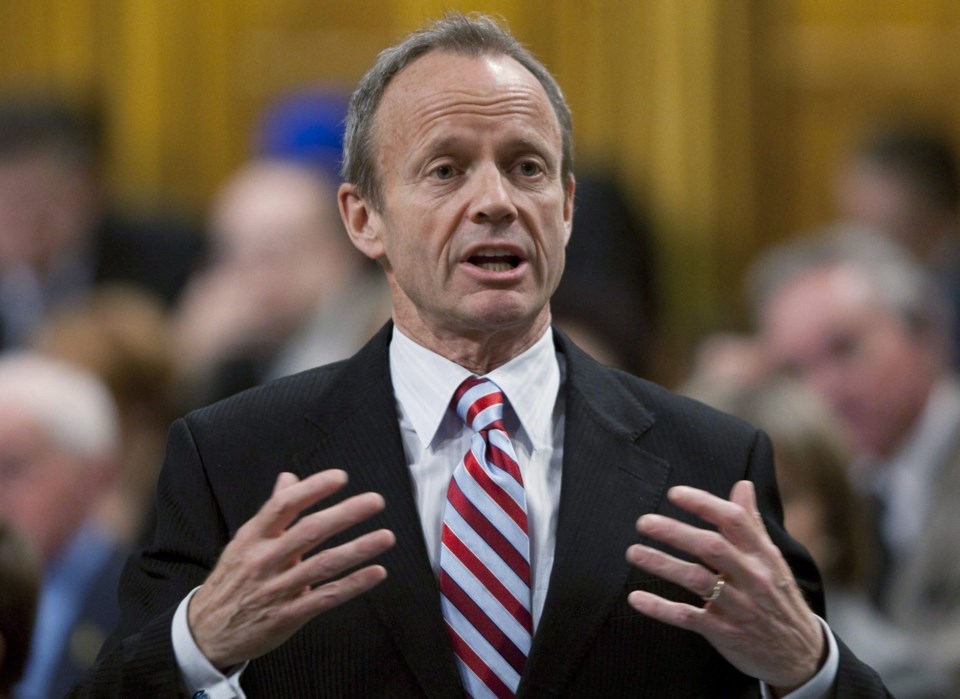OTTAWA — The Alberta separatist movement presents a danger to the federal Conservative party, said former Tory member of Parliament Stockwell Day.
"I'll lose friends saying this: — it will only split the vote and only strengthen the Liberal position," he said in an interview from Edmonton.
In the most recent federal election, more than 1.4 million Albertans voted for a Conservative candidate and elected 34 of the party's 143 MPs.
Day said both an independent Alberta and a separatist party similar to the Bloc Québécois would risk fracturing Conservative support.
The former leader of the Canadian Alliance, who was also a minister in Stephen Harper's cabinet from 2006 to 2011, said he's "as outraged and upset" as the people behind the Alberta separation movement.
"I support everything the separatists are talking about in terms of provincial rights," he said, adding that holding a referendum might help people in other parts of the country "understand how aggrieved we are."
Alberta Premier Danielle Smith's government introduced a bill earlier this month to make it easier to launch a citizen-initiated referendum — including a vote on separating from Canada.
The legislation has faced backlash from Indigenous leaders, who say that no such referendum vote could overturn the treaties that cover much of the province.
Provinces cannot unilaterally separate from the country. If a referendum were to succeed, it would trigger negotiations between the province, the federal government and First Nations groups, among others.
Day said he doesn't think Alberta separatists would get to 50 per cent support in a referendum.
The results of a survey released this week by polling firm Leger suggest he's right.
More than half of Albertans surveyed said they opposed different separation scenarios — ranging from 59 per cent who said no to an independent country made up of Alberta, B.C., Saskatchewan and Manitoba, to 67 per cent who opposed Alberta becoming its own independent country.
A full 80 per cent rejected the idea of becoming a U.S. state.
Leger polled 1,000 Albertans between May 9 and 12. The poll cannot be assigned a margin of error because online surveys are not considered truly random samples.
Support for Albertan independence in Leger's poll was weakest in Calgary and Edmonton. It was stronger among men than women, the survey suggests.
Day said the federal Liberal government still needs to listen to the voices of Western Canadians who feel they aren't getting a fair deal from Ottawa.
He said Prime Minister Mark Carney could have done himself a favour by appointing more Albertans to his cabinet.
"That could have been such a simple gesture, to say from the prime minister, 'I hear you,'" he said.
Edmonton Centre MP Eleanor Olszewski was named minister of emergency management and community resilience in Carney's 28-member cabinet. The only other Alberta Liberal MP, Calgary Confederation's Corey Hogan, is not in cabinet.
Smith has said repeatedly that Albertans are frustrated that the province's natural resources are landlocked and that its oil and gas exports are sold almost exclusively to the United States at a cut rate.
While she said she does not support separating from Canada, she is hoping to negotiate with Carney on a new deal for the province.
"I think Premier Smith is doing the right thing. She's being very clear about the grievances," Day said.
He said Alberta should have more control over its natural resources and areas of provincial jurisdiction, including health care. He said he'd like to see the oil and gas industry get the same recognition from the federal government as the vehicle manufacturing industry that drives Ontario's economy.
Carney isn't the only one who will need to navigate the separatism debate with care.
Conservative Leader Pierre Poilievre, whose 21-year stint as an Ottawa-area MP came to an end in the April 28 election, is planning to run in a byelection in a rural Alberta riding later this summer.
Poilievre hopes to represent the province where he grew up in the fall sitting of the House of Commons.
Day was hesitant to offer his former staffer advice on how to manage the concerns of his future constituents.
"He's a very smart guy. He's a hard worker. He loves Canada and it's going to be his love and fervency for Canada that I think will make him successful in convincing, whether it's his own federal government one day or the Liberals, they've got to address these issues," he said.
He said he wouldn't want to gamble on Alberta's future in the country, noting how close the Quebec referendum came to succeeding. In the 1995 vote, 50.58 per cent of people in Quebec voted against leaving Canada.
"I say to the federal government — you don't want to take that risk," he said. "So listen now, while separatism is having an ascendancy. Listen, because it's serious. And work toward this more autonomous association within Canada."
Asked how he'd vote in a separation referendum, Day was coy.
"I'd have to see what the question would look like," he said, before adding that a more autonomous association within Canada "would be ideal."
This report by The Canadian Press was first published May 16, 2025.
Sarah Ritchie, The Canadian Press




